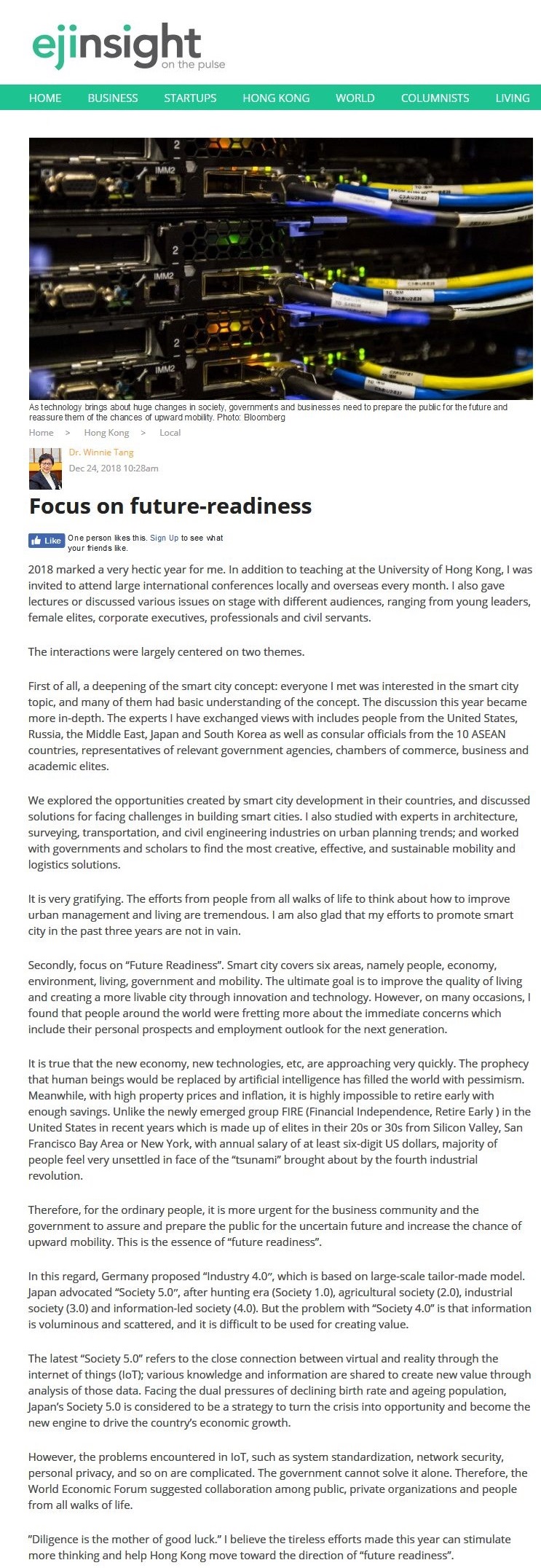網上版請按此

Focus on future-readiness
2018 marked a very hectic year for me. In addition to teaching at the University of Hong Kong, I was invited to attend large international conferences locally and overseas every month. I also gave lectures or discussed various issues on stage with different audiences, ranging from young leaders, female elites, corporate executives, professionals and civil servants.
The interactions were largely centered on two themes.
First of all, a deepening of the smart city concept: everyone I met was interested in the smart city topic, and many of them had basic understanding of the concept. The discussion this year became more in-depth. The experts I have exchanged views with includes people from the United States, Russia, the Middle East, Japan and South Korea as well as consular officials from the 10 ASEAN countries, representatives of relevant government agencies, chambers of commerce, business and academic elites.
We explored the opportunities created by smart city development in their countries, and discussed solutions for facing challenges in building smart cities. I also studied with experts in architecture, surveying, transportation, and civil engineering industries on urban planning trends; and worked with governments and scholars to find the most creative, effective, and sustainable mobility and logistics solutions.
It is very gratifying. The efforts from people from all walks of life to think about how to improve urban management and living are tremendous. I am also glad that my efforts to promote smart city in the past three years are not in vain.
Secondly, focus on "Future Readiness". Smart city covers six areas, namely people, economy, environment, living, government and mobility. The ultimate goal is to improve the quality of living and creating a more livable city through innovation and technology. However, on many occasions, I found that people around the world were fretting more about the immediate concerns which include their personal prospects and employment outlook for the next generation.
It is true that the new economy, new technologies, etc, are approaching very quickly. The prophecy that human beings would be replaced by artificial intelligence has filled the world with pessimism. Meanwhile, with high property prices and inflation, it is highly impossible to retire early with enough savings. Unlike the newly emerged group FIRE (Financial Independence, Retire Early ) in the United States in recent years which is made up of elites in their 20s or 30s from Silicon Valley, San Francisco Bay Area or New York, with annual salary of at least six-digit US dollars, majority of people feel very unsettled in face of the "tsunami" brought about by the fourth industrial revolution.
Therefore, for the ordinary people, it is more urgent for the business community and the government to assure and prepare the public for the uncertain future and increase the chance of upward mobility. This is the essence of "future readiness".
In this regard, Germany proposed "Industry 4.0", which is based on large-scale tailor-made model. Japan advocated "Society 5.0", after hunting era (Society 1.0), agricultural society (2.0), industrial society (3.0) and information-led society (4.0). But the problem with "Society 4.0" is that information is voluminous and scattered, and it is difficult to be used for creating value.
The latest "Society 5.0" refers to the close connection between virtual and reality through the internet of things (IoT); various knowledge and information are shared to create new value through analysis of those data. Facing the dual pressures of declining birth rate and ageing population, Japan's Society 5.0 is considered to be a strategy to turn the crisis into opportunity and become the new engine to drive the country's economic growth.
However, the problems encountered in IoT, such as system standardization, network security, personal privacy, and so on are complicated. The government cannot solve it alone. Therefore, the World Economic Forum suggested collaboration among public, private organizations and people from all walks of life.
"Diligence is the mother of good luck." I believe the tireless efforts made this year can stimulate more thinking and help Hong Kong move toward the direction of "future readiness".
Dr. Winnie Tang
Honorary Professor, Department of Computer Science, The University of Hong Kong